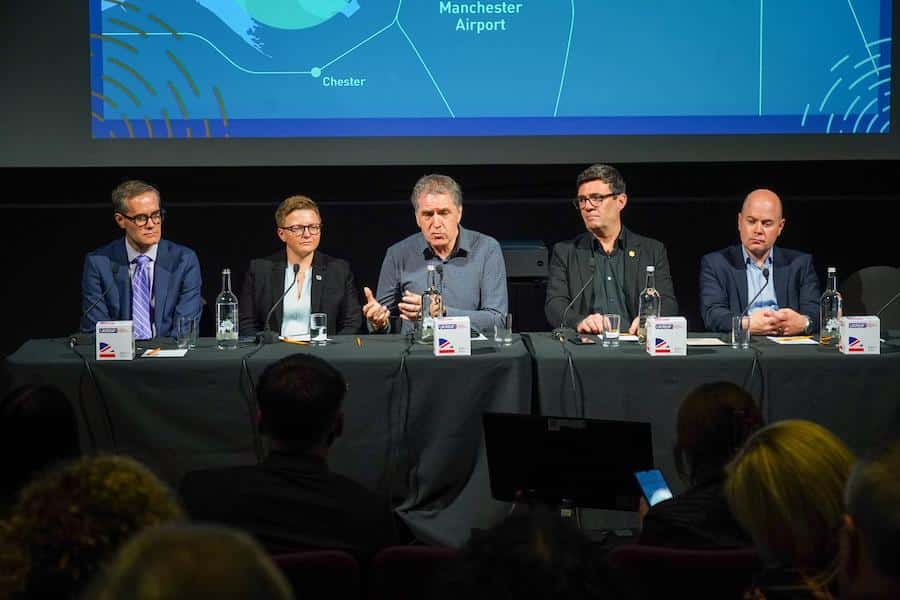200 years on from the first railway – the north west is on verge of rail revolution
- Written by Ethan Davies
- Last updated 11 months ago
- City of Manchester, Public Transport

Two hundred years and two days on from the original Liverpool and Manchester Railway Company’s formation, there are hopes the two cities could be on the brink of another rail revolution.
They are hopes shared by Greater Manchester mayor Andy Burnham, his Liverpool City Region counterpart Steve Rotherham — plus Bev Craig and Liam Robinson, the council leaders in both cities. That’s because they are members of the new Liverpool-Manchester Railway Board, which has been tasked with delivering a new line between the northwest’s largest urban areas.
A Manchester rail revolution?
“This is northwest history being made today,” Andy Burnham announced on Wednesday at UK Real Estate, Investment, and Infrastructure Forum in Leeds.
“On May 20, 1824, the Liverpool and Manchester Railway Company was formed on that day. Here we are 200 years and two days later. You have before you the first members of the new Liverpool-Manchester Railway Board.”
If it comes to fruition, then passengers will be able to nip between Liverpool city centre and Manchester city centre in as little as 35 minutes. They will get off at a revamped Liverpool Central Station, or new underground station at Manchester Piccadilly.
There will be only four stops on the line — the other two being Warrington Bank Quay and Manchester Airport — as the board also eyes separating stopping commuter services, freight trains, and speedy inter-city routes onto different tracks. In all, the project is going to cost at least £17 billion, it’s thought.
And despite the eye-watering sum, in announcing the board, there was a shared sense of belief among the four politicians that, this time, the project won’t hit the buffers.
Northern Powerhouse Rail Manchester to Liverpool Bill
That’s because of some moves made in Parliament last night, Andy Burnham said.
Firstly, the HS2 Crewe to Manchester Bill was formally amended to become the Northern Powerhouse Rail Manchester to Liverpool Bill.
“So there is a Bill in parliament to support the work of this board,” Mr Burnham pointed out. ‘Critically’, he added, rail minister Huw Merriman also ‘confirmed in parliament that an underground station for Manchester Piccadilly is on the table and in a letter to Steve [Rotherham] that the worst option for Liverpool is off the table’.
The Labour shadow cabinet are said to be supportive of the plans, too, should they win power at this year’s election.
Real progress?
Those developments represent ‘real progress’, Mr Burnham said. But he can be more buoyed by the fact that the government has ‘confirmed’, in his words, £17 billion ‘is still in the plan to deliver this new railway’.
And while that is a welcome budget to be starting with, it does expose a potential pitfall in this new railway plan — by the mayor’s own admission.
“I think what we are trying to say is ‘how do we pay for those ambitions in Liverpool city centre, Warrington, the Airport, and in Manchester city centre?’,” Mr Burnham added.
“It’s down to us to see if we can come up with a way to do it and fund the right railway for the north west.”
However, even with question marks over how much of the new project the guaranteed funding will — and no firm commitment to the much-desired-for new Piccadilly and Liverpool Central stations — all four presented a front of confidence.
One suggested solution to the funding question is land value capture, where ‘the increase in land value which comes from policy decisions’ is accounted for on the balance sheet.
“What’s missing from development in UK cities is that basic premise of borrowing against future growth,” explained Coun Bev Craig in a press conference afterwards.
“Land value capture is one mechanism of realising that, but that is a wider ask of the sector of government reform anyway — which isn’t specific to this line — so it’s not necessarily as unusual as might sound, because cities across the country are asking for similar powers.”
The board is additionally keen to work with private firms — even opening it up to expressions of interest — to deliver the project.
Alongside this, there is the aforementioned plan to re-examine where freight trains go in Greater Manchester, which currently travel through the city centre.
Mr Burnham wants to see the Trafford Park freight terminal relocated to Port Salford, or the developing Parkside in Warrington, just over the border from Wigan, to alleviate rail congestion.
Additionally, there are still long-term ambitions for a direct line ‘through Manchester to Bradford and Leeds’, he told journalists.
Expansion into Yorkshire?
Any potential Yorkshire expansion is secondary to the Liverpool-Manchester connection, it appears. But that doesn’t mean it will be here any time soon, however.
“That company back then built that railway in six years,” Mr Burnham said. “Can we do that?,” he then asked the panel.
“It’s a tall order,” Steve Rotherham replied. “I don’t know about that,” Mr Burnham added to answer his own question. “But we’ll do our best.”
You can find out more about the Liverpool-Manchester Railway Board by clicking here
- This article was last updated 11 months ago.
- It was first published on 23 May 2024 and is subject to be updated from time to time. Please refresh or return to see the latest version.
Did we miss something? Let us know: press@ilovemanchester.com
Want to be the first to receive all the latest news stories, what’s on and events from the heart of Manchester? Sign up here.
Manchester is a successful city, but many people suffer. I Love Manchester helps raise awareness and funds to help improve the lives and prospects of people across Greater Manchester – and we can’t do it without your help. So please support us with what you can so we can continue to spread the love. Thank you in advance!
An email you’ll love. Subscribe to our newsletter to get the latest news stories delivered direct to your inbox.
Got a story worth sharing?
What’s the story? We are all ears when it comes to positive news and inspiring stories. You can send story ideas to press@ilovemanchester.com
While we can’t guarantee to publish everything, we will always consider any enquiry or idea that promotes:
- Independent new openings
- Human interest
- Not-for-profit organisations
- Community Interest Companies (CiCs) and projects
- Charities and charitable initiatives
- Affordability and offers saving people over 20%
For anything else, don’t hesitate to get in touch with us about advertorials (from £350+VAT) and advertising opportunities: advertise@ilovemanchester.com

National Trust Sky Gardening challenge brings nature to the city

NØELLE on finding freedom, inspiration and innovation in Salford’s creative scene



















